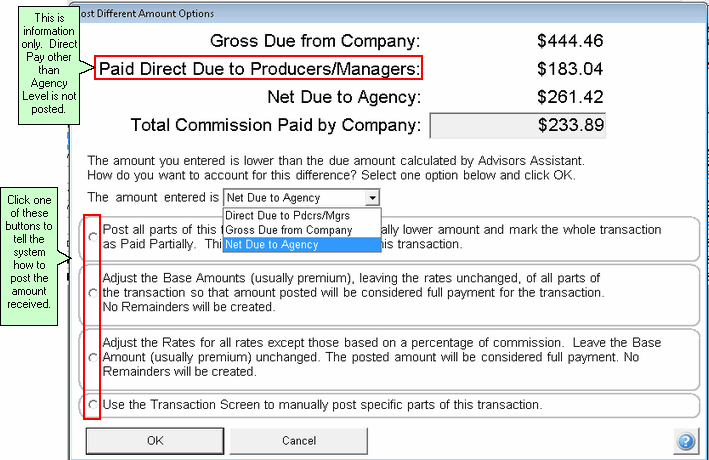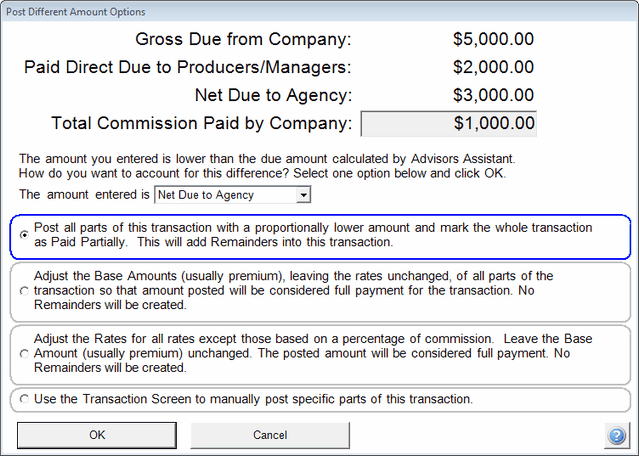Post Different Amount Options
From the Posting Screen, choose the Post Different Amount Button, or from the Commission Distribution Screen, choose the Post Different Amount Button.
Posting Different Amounts Overview
When you post a different amount than is calculated as due, you need to make some choices so that the system will remain in balance.
When you receive a different amount of commission on a policy, you must first decide:
| • | Is the amount actually received correct? |
| • | What may have changed with the policy to cause the amount to change? |
Group Insurance
Group insurance presents special circumstances because the agency selling the policy does not receive day to day changes in the group census data. That data goes directly the insurance company or the third party administrator.
In the case of Group Insurance, you will usually use the second or third bullet so that the Base Amount x Rate will equal the commission.
Note: It's a good idea to use the comment field, especially if you are using the 4th option.
Options When Posting Different Amounts
When a different amount is posted, one of various conditions exists.
| • | The amount you received was the wrong amount and you are still owed money. |
| • | The premium in the policy has changed (such as a group policy changing participation) and the amount received is correct, so you want to pay your producers based on a the smaller premium. |
| • | The premium stayed the same, but the rates paid changed due to some kind of step rated system, so you want to pay producers a lower percentage if they are paid other than based on a percentage of your commission. |
| • | None of these automatic scenarios work and you want to adjust each commission yourself. |
| • | One full component of your commission was not paid, such as the exact amount of an override and you are still owed it. |

In the case above, $2,000 was received instead of 3,000 . One of the following choices must be made:
1. Post Proportionately To All Levels - Create A Remainder Transaction
This first option assumes the amount due is correct and that you received less than owed. Choosing this option will post the agency and all of the producers and managers so they will be paid the portion of the commission received by the agency. Then a remainder will be created so that the remaining amount is still carried by Advisors Assistant as due.
2. Adjust The Base Amounts To Make The Math Work - No Remainder
The second option tells Advisors Assistant to adjust the base amount used to calculate the commission so that Base Amount x Rate will equal the commission you posted. This assumes that no further commission is due. Only the Base Amount for this transaction is changed - no changes are made at the policy level.
In the case of Group Insurance, if the premium has changed due to census changes, this would be a good choice.
Direct Pay Involved
When Direct Payments are involved, and proportions are used, the system may ask you to provide which factor listed should be used as the denominator when changing the Base Amounts or the Rates.
Net Due To Agency
When direct payments are involved, this will usually be the choice since you will usually be receiving only the agency's share.
In the example above, the system calculated that $261.42 was due based on the Base Amount used. However, $233.89 was posted and is the correct amount. Choosing this option tells the system to change the Base Amount to the Current Base Amount x ($233.89 / $261.42). If the Base Amount were a premium, and it was originally $1,000, it would be changed to $894.69 for both the transaction and the policy record.
Gross Due From Company
When direct payments are not involved, this would usually be the choice since the agency would be receiving both it's share and the amount the agency would be paying producers and managers. You would not choose this for the example above.
In this case, the base amounts or the rate would be multiplied by the amount posted divided by gross due to the agency.
Direct Due To Producers / Managers
This choice would be rare and is only presented for unlikely events. If you choose this the Base Amounts or the Rate would be multiplied by the amount you posted divided by the amount paid directly to Producers and Managers.
3. Adjust The Rate Used To Make The Math Work - No Remainder
You can also adjust the rate used to calculate the commission so that Base Amount x Rate will equal the commission due.
If you are tracking Group Insurance and the company uses a stepped down set of commission rates, this would be a good choice because it will use a blended rate. Only the rate for this transaction is changed. The rate table will not be changed.
When producers or managers are paid based on Agency Commission, their commission rate is not adjusted. They will still receive the contracted rate. This is done so as not to violate the agreement the agency has with the producer. The Agency's Commission will be adjusted when the rate paid to the agency is adjusted up or down.
If you are presented with the drop down list, the choices shown in blue above apply.
4. Use The Transaction Screen To Manually Adjust Commission Components Yourself
Choosing the 4th option will return you to the distribution screen so that you can manually adjust any of the commission components yourself.
The other choices still remain, but the additional choice provides the flexibility of not posting a single component. Producers who share in that component will also not be posted.
When you click OK, the new amounts will be displayed on the Distribution Screen.
Typical Different Amount Option Example
The screen shot below is a typical example where producers are being paid a percentage of the Agency Commission and the agency is paid a different different amount than due, AND the amount is NOT the correct amount. A new "remainder transaction" is created reflecting the amounts still owed.

Agency Has Been Underpaid
In the example above, the producers are being paid directly by the company, but the agency has been underpaid. The user is telling Advisors Assistant to post the $1,000 against the $3,000 due the agency and to create a remainder transaction for $2,000. The system will also make the assumption that the producers have been underpaid and post their "direct pay" transactions proportionately. However, there is really no way for the agency to know what really happened at the producer level since that is between the company and the producer.
See Also
Modify Commission Distributions
|
When posting different amounts, pay close attention to the options presented and check that the option you choose produces the result you expect. |
